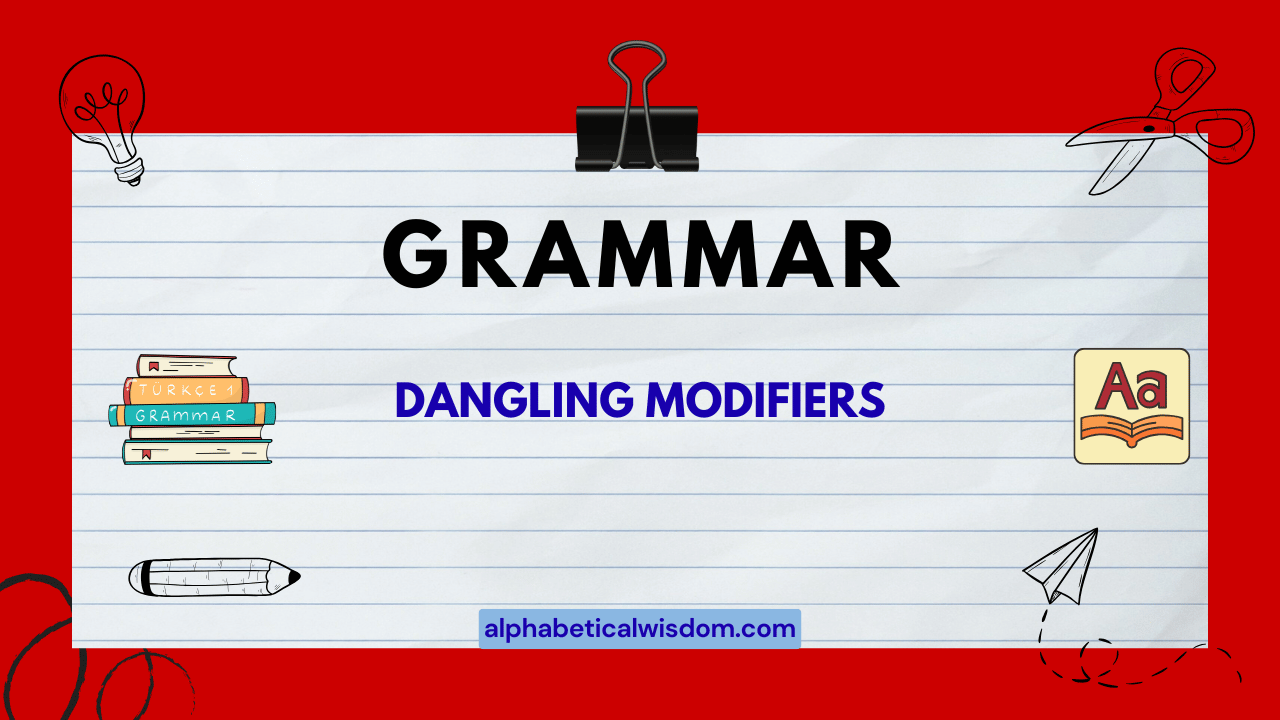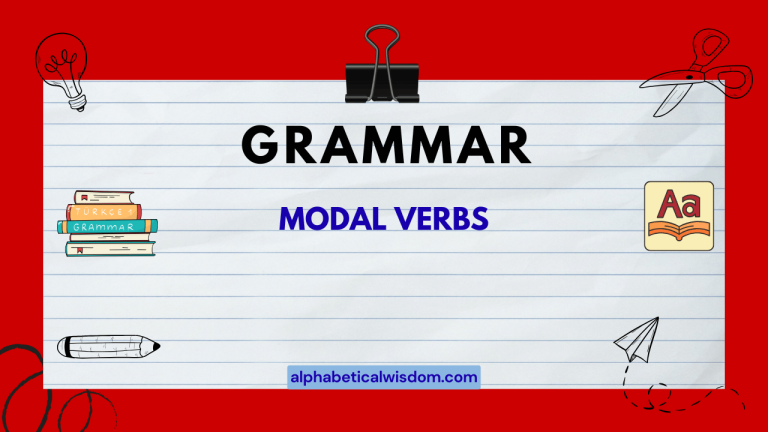Dangling Modifiers: Mastering Clarity in Sentence Structure
Dangling modifiers are a common grammatical error that can lead to confusion and ambiguity in writing. Understanding how to identify and correct them is crucial for clear and effective communication.
This article provides a comprehensive guide to dangling modifiers, covering their definition, structure, types, and usage rules. Whether you’re a student, a professional writer, or simply someone looking to improve their grammar skills, this guide will equip you with the knowledge and tools to master this important aspect of English grammar and ensure that your writing is precise and easily understood.
This article is designed for English language learners, writers, and anyone seeking to refine their understanding of grammar. By mastering dangling modifiers, you can significantly enhance the clarity and precision of your writing.
Table of Contents
- Introduction
- Definition of Dangling Modifiers
- Structural Breakdown
- Types or Categories
- Examples
- Usage Rules
- Common Mistakes
- Practice Exercises
- Advanced Topics
- FAQ
- Conclusion
Definition of Dangling Modifiers
A dangling modifier is a word, phrase, or clause that describes something, but the sentence doesn’t clearly state what it’s describing. In simpler terms, it’s a modifier that doesn’t have a clear or logical connection to the word or words it’s supposed to modify. This lack of connection creates confusion for the reader, as the modifier seems to be “dangling” without anything to attach to properly.
Classification
Dangling modifiers are classified as a type of grammatical error that affects sentence clarity. They fall under the broader category of modifier errors, which also includes misplaced modifiers.
The key distinction is that a misplaced modifier is simply in the wrong position within the sentence, while a dangling modifier has no clear subject to modify at all.
Function
The function of a modifier is to provide additional information about a noun or verb in a sentence. When a modifier dangles, it fails to fulfill this function effectively.
Instead of adding clarity, it introduces ambiguity and can even create unintended or humorous meanings. The primary goal of correcting dangling modifiers is to ensure that the meaning of the sentence is clear and unambiguous.
Contexts
Dangling modifiers can appear in various types of writing, from academic papers and professional reports to informal emails and creative writing. They are particularly common in complex sentences with multiple phrases and clauses.
Being vigilant in all writing contexts is essential to avoid this error and maintain clarity.
Structural Breakdown
The structure of a sentence containing a dangling modifier typically involves a modifying phrase or clause at the beginning of the sentence, followed by a main clause that does not logically connect to the modifier. Let’s break down the common structural elements that contribute to this error.
A dangling modifier often starts with a participial phrase (e.g., Walking down the street), an infinitive phrase (e.g., To get good grades), or a prepositional phrase (e.g., After finishing the homework). The problem arises when the noun or pronoun that the phrase is intended to modify is missing or unclear in the main clause.
For example, in the sentence “Walking down the street, the tree was beautiful,” the participial phrase “Walking down the street” is meant to modify a person, but the main clause only mentions “the tree.” This creates a dangling modifier because the tree cannot be walking down the street.
The key to identifying and correcting dangling modifiers is to ensure that the subject of the main clause is the same as the implied subject of the modifying phrase. If they don’t match, the modifier is dangling and needs to be revised.
Types or Categories
Dangling modifiers can be classified based on the type of phrase or clause that is dangling. Here are the main categories:
Participial Phrases
Participial phrases begin with a participle (a verb form ending in -ing or -ed) and modify a noun or pronoun. When the noun or pronoun being modified is missing or unclear, the participial phrase dangles.
Example: Running quickly, the bus was missed. (Incorrect) – The bus cannot run.
Corrected: Running quickly, I missed the bus. (Correct)
Infinitive Phrases
Infinitive phrases consist of “to” followed by a verb and modify a noun or pronoun. When the phrase doesn’t logically connect to the subject of the main clause, it dangles.
Example: To get good grades, studying is necessary. (Incorrect) – Studying cannot get good grades.
Corrected: To get good grades, you must study. (Correct)
Prepositional Phrases
Prepositional phrases begin with a preposition (e.g., in, on, at, after) and modify a noun or pronoun. If the phrase doesn’t clearly relate to the subject of the main clause, it dangles.
Example: After finishing the homework, the TV was turned on. (Incorrect) – The TV cannot finish homework.
Corrected: After finishing the homework, I turned on the TV. (Correct)
Elliptical Clauses
Elliptical clauses are clauses where some words are omitted but understood. If the omitted subject is different from the subject of the main clause, the clause dangles.
Example: While baking the cake, the oven was preheated. (Incorrect) – The oven cannot bake a cake.
Corrected: While I was baking the cake, the oven was preheated. (Correct)
Examples
To further illustrate the concept of dangling modifiers, let’s look at a variety of examples organized by the type of phrase or clause involved.
Participial Phrase Examples
The following table provides examples of sentences with dangling participial phrases and their corrected versions.
| Incorrect (Dangling) | Corrected |
|---|---|
| Walking home, the rain started to fall. | Walking home, I noticed the rain started to fall. |
| Having finished the test, the pencils were put away. | Having finished the test, the students put the pencils away. |
| Smiling brightly, the gift was opened. | Smiling brightly, she opened the gift. |
| Being tired, a nap was taken. | Being tired, I took a nap. |
| Running late, the door slammed shut. | Running late, I slammed the door shut. |
| Knowing the answer, the hand was raised. | Knowing the answer, she raised her hand. |
| Feeling sick, the doctor was called. | Feeling sick, I called the doctor. |
| Watching the movie, the popcorn was eaten. | Watching the movie, we ate the popcorn. |
| Listening to music, the dishes were washed. | Listening to music, I washed the dishes. |
| Having studied hard, the exam was passed. | Having studied hard, she passed the exam. |
| Wearing a hat, the sun was blocked. | Wearing a hat, I blocked the sun from my eyes. |
| Standing on the balcony, the view was amazing. | Standing on the balcony, I thought the view was amazing. |
| Talking on the phone, the dinner burned. | Talking on the phone, I burned the dinner. |
| Looking at the stars, a wish was made. | Looking at the stars, I made a wish. |
| Having eaten dinner, the dishes were left. | Having eaten dinner, we left the dishes. |
| Singing loudly, the neighbors complained. | Singing loudly, I annoyed the neighbors. |
| Climbing the mountain, the view was breathtaking. | Climbing the mountain, I found the view breathtaking. |
| Driving fast, the police stopped the car. | Driving fast, I was stopped by the police. |
| Waiting for the bus, the time passed slowly. | Waiting for the bus, I felt the time pass slowly. |
| Leaving the house, the keys were forgotten. | Leaving the house, I forgot the keys. |
Infinitive Phrase Examples
The following table provides examples of sentences with dangling infinitive phrases and their corrected versions.
| Incorrect (Dangling) | Corrected |
|---|---|
| To understand the topic, research is needed. | To understand the topic, you need to do research. |
| To bake a cake, the oven must be preheated. | To bake a cake, you must preheat the oven. |
| To succeed in business, hard work is essential. | To succeed in business, you must work hard. |
| To lose weight, exercise is necessary. | To lose weight, you need to exercise. |
| To learn a language, practice is important. | To learn a language, you must practice. |
| To fix the car, tools are required. | To fix the car, you need the right tools. |
| To pass the exam, studying is crucial. | To pass the exam, you must study. |
| To write a good essay, planning is essential. | To write a good essay, you must plan carefully. |
| To get a promotion, performance matters. | To get a promotion, you must perform well. |
| To make a profit, investment is necessary. | To make a profit, you must invest wisely. |
| To build a house, permits are needed. | To build a house, you must obtain permits. |
| To climb the mountain, experience is required. | To climb the mountain, you must have experience. |
| To drive safely, attention is necessary. | To drive safely, you must pay attention. |
| To cook a good meal, fresh ingredients are best. | To cook a good meal, you should use fresh ingredients. |
| To play the piano, practice is essential. | To play the piano, you must practice regularly. |
| To paint a masterpiece, talent is helpful. | To paint a masterpiece, having talent helps. |
| To run a marathon, training is crucial. | To run a marathon, you must train diligently. |
| To speak confidently, preparation is needed. | To speak confidently, you must prepare thoroughly. |
| To solve the problem, creativity is important. | To solve the problem, you must be creative. |
| To start a business, capital is necessary. | To start a business, you must have capital. |
Prepositional Phrase Examples
The following table provides examples of sentences with dangling prepositional phrases and their corrected versions.
| Incorrect (Dangling) | Corrected |
|---|---|
| After the long meeting, the chairs were put away. | After the long meeting, the staff put the chairs away. |
| Before going to bed, the lights were turned off. | Before going to bed, I turned off the lights. |
| During the movie, the phone rang loudly. | During the movie, my phone rang loudly. |
| At the age of ten, my family moved to a new city. | At the age of ten, I moved with my family to a new city. |
| In the dark, shadows appeared scary. | In the dark, the shadows appeared scary to me. |
| On the table, the book was placed carefully. | On the table, I placed the book carefully. |
| With great excitement, the party was planned. | With great excitement, we planned the party. |
| By working hard, success can be achieved. | By working hard, you can achieve success. |
| For a quick meal, the microwave is perfect. | For a quick meal, I use the microwave. |
| Without studying, the test cannot be passed. | Without studying, you cannot pass the test. |
| Over the mountains, the sun sets beautifully. | Over the mountains, we watched the sun set beautifully. |
| Through the forest, the path was hard to find. | Through the forest, I found the path hard to find. |
| Under the bridge, the river flowed swiftly. | Under the bridge, we watched the river flow swiftly. |
| Around the corner, the store was located. | Around the corner, I found the store. |
| Besides being expensive, the car is beautiful. | Besides being expensive, I think the car is beautiful. |
| Despite the rain, the game continued. | Despite the rain, the players continued the game. |
| Following the instructions, the cake was baked. | Following the instructions, I baked the cake. |
| Inside the box, the gift was hidden. | Inside the box, I hid the gift. |
| Near the beach, the hotel was situated. | Near the beach, we found the hotel. |
| Upon arriving home, dinner was ready. | Upon arriving home, I found dinner was ready. |
Elliptical Clause Examples
The following table provides examples of sentences with dangling elliptical clauses and their corrected versions.
| Incorrect (Dangling) | Corrected |
|---|---|
| While reading the book, the cat jumped on my lap. | While I was reading the book, the cat jumped on my lap. |
| When only five years old, my mother taught me to read. | When I was only five years old, my mother taught me to read. |
| If left unattended, the soup will burn. | If the soup is left unattended, it will burn. |
| Although difficult, the task was completed. | Although the task was difficult, it was completed. |
| Until cooked thoroughly, the chicken is unsafe to eat. | Until the chicken is cooked thoroughly, it is unsafe to eat. |
| Before going to work, the dog needs to be walked. | Before I go to work, the dog needs to be walked. |
| After being washed, the car looked brand new. | After the car was washed, it looked brand new. |
| While studying, the music helped me focus. | While I was studying, the music helped me focus. |
| If done correctly, the results will be accurate. | If the experiment is done correctly, the results will be accurate. |
| When finished, the report should be submitted. | When you are finished, the report should be submitted. |
| Although tempting, the offer was refused. | Although the offer was tempting, I refused it. |
| Unless notified otherwise, the meeting will proceed. | Unless you are notified otherwise, the meeting will proceed. |
| Before eating, hands should be washed. | Before you eat, your hands should be washed. |
| If necessary, a doctor should be consulted. | If it is necessary, you should consult a doctor. |
| While driving, cell phones should not be used. | While you are driving, you should not use cell phones. |
| When walking at night, caution is advised. | When you are walking at night, caution is advised. |
| If possible, the problem should be solved quickly. | If it is possible, you should solve the problem quickly. |
| Although challenging, the project was rewarding. | Although the project was challenging, it was rewarding. |
| Until proven otherwise, the suspect is considered innocent. | Until it is proven otherwise, the suspect is considered innocent. |
| Before beginning, all instructions should be read. | Before you begin, you should read all instructions. |
Mixed Examples
This section provide a variety of examples, combining different modifiers, to help identify and correct dangling modifiers.
| Incorrect (Dangling) | Corrected |
|---|---|
| After being thoroughly cleaned, the shiny car looked great. | After I thoroughly cleaned it, the car looked shiny and great. |
| To fully appreciate the artwork, standing back is helpful. | To fully appreciate the artwork, you should stand back. |
| While carefully stirring the sauce, the aroma filled the kitchen. | While I was carefully stirring the sauce, the aroma filled the kitchen. |
| Having been lost for hours, rescue arrived. | Having been lost for hours, we were rescued. |
| To avoid getting burned, sunscreen should be applied. | To avoid getting burned, you should apply sunscreen. |
| When properly installed, the shelf can hold a lot of weight. | When the shelf is properly installed, it can hold a lot of weight. |
| After spending all day shopping, a long rest was needed. | After I spent all day shopping, a long rest was needed. |
| To effectively manage your time, a schedule is essential. | To effectively manage your time, you must create a schedule. |
| While diligently studying, the concepts became clearer. | While I was diligently studying, the concepts became clearer. |
| Having finished the project, celebration was in order. | Having finished the project, we had a celebration. |
Usage Rules
To avoid dangling modifiers, follow these essential rules:
Rule 1: Ensure the Modifier Clearly Refers to the Subject
The most important rule is to make sure that the subject of the main clause is the same as the implied subject of the modifying phrase or clause. If they don’t match, the modifier is dangling and needs to be revised.
This can be achieved by rewriting the main clause to include the correct subject.
For example, instead of saying, “Walking down the street, the shops looked interesting,” rewrite it as “Walking down the street, I thought the shops looked interesting.” This correction makes it clear that “I” am the one walking down the street.
Rule 2: Place the Modifier Close to the Modified Word
While not always a case of dangling, proximity matters. Place the modifying phrase or clause as close as possible to the word or words it is intended to modify.
This helps to avoid ambiguity and ensures that the reader can easily understand the relationship between the modifier and the modified element.
For example, instead of “I saw a dog running down the street yesterday with brown fur,” a clearer sentence would be “Yesterday, I saw a dog with brown fur running down the street.“
Exceptions and Special Cases
There are a few exceptions where a modifier might seem to dangle but is considered acceptable in common usage. These typically involve idiomatic expressions or phrases where the implied subject is universally understood.
For example, phrases like “Generally speaking” or “Considering the circumstances” are often used without a specific subject, and their meaning is generally clear from the context. However, it’s best to use these sparingly and only when the meaning is absolutely clear to the reader.
Common Mistakes
One common mistake is failing to identify the implied subject of the modifying phrase. For example, in the sentence “After eating dinner, the dishes were washed,” it’s not clear who ate dinner. The corrected sentence should be “After eating dinner, I washed the dishes.“
Another frequent error is simply overlooking the mismatch between the modifier and the subject of the main clause. Careful proofreading and attention to detail can help catch these mistakes.
Reading the sentence aloud can also help identify awkward phrasing that may indicate a dangling modifier.
Here are some examples of common mistakes and their corrections:
| Incorrect (Dangling) | Corrected |
|---|---|
| Having been repaired, John drove the car. | Having been repaired, the car was driven by John. |
| To make a good impression, a suit should be worn. | To make a good impression, you should wear a suit. |
| While watching TV, the doorbell rang. | While I was watching TV, the doorbell rang. |
| After the rain, the sky was blue. | After the rain stopped, the sky was blue. |
Practice Exercises
Test your understanding of dangling modifiers with these exercises.
Exercise 1: Identifying Dangling Modifiers
Identify whether the following sentences contain a dangling modifier. Write “Yes” if it contains a dangling modifier and “No” if it is correct.
| Sentence | Dangling Modifier? (Yes/No) |
|---|---|
| Walking through the park, the flowers smelled wonderful. | |
| Having finished my homework, I watched a movie. | |
| To bake a cake, you need flour, sugar, and eggs. | |
| After eating dinner, the dishes were washed. | |
| While driving to work, I listened to the radio. | |
| Covered in mud, I hosed off the dog. | |
| To succeed in business, hard work is required. | |
| Before leaving the house, the door was locked. | |
| Walking down the street, I saw a cat. | |
| Having studied hard, the test was easy. |
Answer Key:
- Yes
- No
- No
- Yes
- No
- No
- No
- Yes
- No
- Yes
Exercise 2: Correcting Dangling Modifiers
Rewrite the following sentences to correct the dangling modifiers.
| Sentence with Dangling Modifier | Corrected Sentence |
|---|---|
| Running late, the bus was missed. | |
| To pass the test, studying is important. | |
| After cleaning the kitchen, the floor was mopped. | |
| Walking along the beach, the sunset was beautiful. | |
| Having finished the book, it was returned to the library. | |
| To make a cake, the oven must be preheated. | |
| When only five years old, my father taught me to swim. | |
| While watching the movie, the popcorn was eaten quickly. | |
| After being painted, the car looked new. | |
| To get good grades, effort is needed. |
Answer Key:
- Running late, I missed the bus.
- To pass the test, you must study.
- After cleaning the kitchen, I mopped the floor.
- Walking along the beach, I thought the sunset was beautiful.
- Having finished the book, I returned it to the library.
- To make a cake, you must preheat the oven.
- When I was only five years old, my father taught me to swim.
- While I was watching the movie, I ate the popcorn quickly.
- After the car was painted, it looked new.
- To get good grades, you need to make an effort.
Exercise 3: Rewriting Sentences
Rewrite the following sentences to eliminate the dangling modifier. You may need to change the wording significantly.
| Original Sentence | Rewritten Sentence |
|---|---|
| After the rain, the streets were wet. | |
| To enjoy the concert, arriving early is a good idea. | |
| While cooking dinner, the smoke alarm went off. | |
| Having practiced for hours, the concert went well. | |
| To understand the lecture, taking notes is helpful. | |
| After the meeting, the report was written. | |
| To learn the material, studying is essential. | |
| While hiking in the mountains, a bear was seen. | |
| Having finished the project, a party was planned. | |
| To improve your health, exercise regularly. |
Answer Key:
- After it rained, the streets were wet.
- To enjoy the concert, you should arrive early.
- While I was cooking dinner, the smoke alarm went off.
- Because they had practiced for hours, the musicians gave a good concert.
- To understand the lecture, you should take notes.
- After the meeting, I wrote the report.
- To learn the material, you must study.
- While we were hiking in the mountains, we saw a bear.
- Having finished the project, we planned a party.
- To improve your health, you should exercise regularly.
Advanced Topics
For advanced learners, exploring the nuances of modifier usage can further refine their writing skills.
Misplaced Modifiers vs. Dangling Modifiers
It’s important to distinguish between misplaced and dangling modifiers. A misplaced modifier is a modifier that is in the wrong position in a sentence, making the sentence awkward or unclear, but still logically connected to a subject. A dangling modifier, on the other hand, has no clear connection to any word in the sentence.
Misplaced: I saw a dog on my way home wearing a hat. (The hat is on the way home, not the dog.)
Corrected: On my way home, I saw a dog wearing a hat.
Dangling: Walking down the street, the store was on the left. (The store isn’t walking.)
Corrected: Walking down the street, I saw the store on the left.
Intentional Dangling Modifiers in Literature
While generally considered an error, some writers intentionally use dangling modifiers for stylistic effect. This can create a sense of informality or stream-of-consciousness narration.
However, this technique should be used sparingly and only when the intended meaning is clear, as overuse can lead to confusion.
Example: “Lost in thought, the day passed quickly.” This could be used to convey a character’s state of mind, even though “the day” cannot literally be lost in thought.
FAQ
- What is a dangling modifier?
A dangling modifier is a word, phrase, or clause that describes something, but the sentence doesn’t clearly state what it’s describing. It lacks a clear or logical connection to the word or words it’s supposed to modify, causing confusion.
- How can I identify a dangling modifier?
Look for modifying phrases or clauses at the beginning of a sentence. Check if the subject of the main clause is the same as the implied subject of the modifier. If they don’t match, the modifier is likely dangling.
- What are the common types of dangling modifiers?
The common types include participial phrases, infinitive phrases, prepositional phrases, and elliptical clauses.
- How do I correct a dangling modifier?
You can correct a dangling modifier by rewriting the main clause to include the correct subject or by rewriting
the modifying phrase to clearly connect to the subject of the main clause.
- Are there any exceptions to the rule against dangling modifiers?
Yes, there are a few exceptions where a modifier might seem to dangle but is considered acceptable in common usage, such as idiomatic expressions or phrases where the implied subject is universally understood.
- What is the difference between a misplaced modifier and a dangling modifier?
A misplaced modifier is in the wrong position in a sentence but still logically connected to a subject, while a dangling modifier has no clear connection to any word in the sentence.
- Can dangling modifiers be used intentionally in writing?
Yes, some writers intentionally use dangling modifiers for stylistic effect, such as creating a sense of informality or stream-of-consciousness narration. However, this should be used sparingly and only when the intended meaning is clear.
- Why is it important to avoid dangling modifiers?
Avoiding dangling modifiers is crucial for clear and effective communication. They can lead to confusion and ambiguity, making it difficult for the reader to understand the intended meaning of the sentence.
Conclusion
Mastering the identification and correction of dangling modifiers is essential for writing clear, concise, and effective sentences. By understanding the structure, types, and usage rules of modifiers, you can avoid common grammatical errors and ensure that your writing conveys your intended meaning accurately.
Regular practice and careful proofreading will help you develop a keen eye for dangling modifiers, allowing you to refine your writing skills and communicate with greater precision. Whether you’re a student, a professional, or simply someone who values clear communication, taking the time to understand and correct dangling modifiers is a worthwhile investment in your writing abilities.






